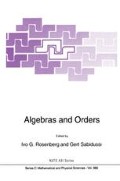Abstract
Partial algebras are among the basic mathematical structures implemented on computers. Many-sorted algebras are basically partial algebras, too. These notes are meant to introduce into a theory of and a language for partial algebras in such a way that also a specification of (many-sorted) partial algebras as abstract data types can easily be performed. Besides the terminology and constructions from universal algebra (homomorphisms, generalized recursion theorem, epimorphism theorem, free partial algebras) also such from logic (existence equations and elementary implications), model theory (preservation and reflection of formulas by mappings) and from (elementary) category theory (factorization systems) prove to be quite useful for a good description of the arising concepts, as is shown at the end by the formulation of a “Meta Birkhoff Theorem”.
Special thanks are due to Norbert Newrly, who did the typing and assisted also with the more difficult drawings and some corrections. Further corrections are due to W. Bartol, B. Wojdylo and F. Rosselló.
Access this chapter
Tax calculation will be finalised at checkout
Purchases are for personal use only
Preview
Unable to display preview. Download preview PDF.
References
Andrka, H., Nmeti, I., Injectivity in categories to represent all first order formulas. I., Demonstratio Math. 12 (1979), 717–732.
Andréka, H., Németi, I., A general axiomatizability theorem formulated in terms of cone-injective subcategories, in: Universal Algebra (Proc. Coll. Esztergom 1977), Colloq. Math. Soc. Janos Bolyai 29, North-Holland, Amsterdam, 1982, 13–35.
Andréka, H., Németi, I., Generalization of the concept of variety and quasivariety to partial algebras through category theory, Dissertationes Math. (Rozprawy Mat.) 204, Warszawa, 1983.
Burmeister, P., Partial algebras–survey of a unifying approach towards a two-valued model theory for partial algebras, Algebra Universalis 15 (1982), 306–358.
Burmeister, P., A Model Theoretic Oriented Approach to Partial Algebras. Introduction to Theory and Application of Partial Algebras - Part I,Mathematical Research Vol. 32, Akademie-Verlag, Berlin, 1986. (Part II: [Re84]).
Craig, W., Near-equational and equational systems of logic for partial functions. I and II, J. Symbolic Logic 54 (1989), 759–827, and 1181–1215.
Evans, T., Embeddability and the word problem, J. London Math. Soc. 26 (1951), 64–71.
Goguen, J.A., Thatcher, J.W., Wagner, E.G., An initial algebra approach to the specification, correctness, and implementation of abstract data types (IBM Research Report RC-6487, 1976 ) in: Current Trends in Programming Methodology, IV: Data Structuring (R. Yeh, ed. ), Prentice Hall, 1978, 80–144.
Grätzer, G., Schmidt, E.T., Characterization of congruence lattices of abstract algebras, Acta Sci. Math. (Szeged) 24 (1963), 34–59.
Herrlich, H., Strecker, G.E., Caterogy Theory - An Introduction,Allyn and Bacon, 1973 (2nd ed.: Heldermann-Verlag).
Höft, H., Equations in Partial Algebras, Ph.D. Thesis, University of Houston, 1970.
Höft, H., Weak and strong equations in partial algebras, Algebra Universalis 3 (1973), 203–215.
John, R., Gültigkeitsbegriffe für Gleichungen in partiellen Algebren, Dissertation, TH Darmstadt, 1975.
John, R., Gültigkeitsbegriffe für Gleichungen in partiellen Algebren, Math. Z. 159 (1978), 25–35.
Kerkhoff, R., Gleichungsdefinierbare Klassen partieller Algebren, Math. Ann. 185 (1970), 112–133.
Kleene, S.C., Introduction to Metamathematics, North-Holland, Amsterdam, 1952.
Kochen, S., Specker, E.P., The problem of hidden variables in Quantum Mechanics, J. Math. Mech. 17 (1968), 59–87.
Kosiuczenko, P., Mal’cev type conditions for partial algebras, Manuscript, Politechnika Warszawska 1990, submitted to Algebra Universalis.
Lampe, W.A., On Related Structures of a Universal Algebra, Ph.D. Thesis, Pennsylvania State University, 1969.
Marczewski, E., A general scheme of independence in mathematics, Bull. Acad. Polon. Sci. Sér. Math. Astr. Phys. 6 (1958), 731–736.
Németi, I., Sain, I., Cone-implicational subcategories and some Birkhoff-type theorems, in: Universal Algebra (Proc. Coll. Esztergom 1977), Colloq. Math. Soc. Janos Bolyai 29, North-Holland, Amsterdam, 1982, 535–578.
Pasztor, A., Faktorisierungssysteme in der Kategorie der partiellen Algebren - Kennzeichnung von (Homo-)Morphismen, Dissertation, TH Darmstadt, 1979; appeared in: Hochschulverlag, Freiburg, 1979.
Reichel, H., Structural Induction on Partial Algebras. Introduction to Theory and Applications of Partial Algegras - Part II,Mathematical Research, Vol. 18, Akademie-Verlag, Berlin, 1984. (Part I: [B86]).
Rudak, L., A completeness theorem for weak equational logic, Algebra Universalis 16 (1983), 331–337.
Schmidt, J., Die Charakteristik einer Allgemeinen Algebra I., Arch. Math. 13 (1962), 457–470.
Schmidt, J., Die Charakteristik einer Allgemeinen Algebra II., Arch. Math. 15 (1964), 286–301.
Schmidt, J., A homomorphism theorem for partial algebras, Colloq. Math. 21 (1970), 5–21.
Slominski, J., A theory of extensions of quasi-algebras to algebras, Rozprawy Mat.40 (1964).
Strecker, G.E., Epireflection operators vs perfect morphisms and closed classes of epimorphisms, Bull. Austral. Math. Soc. 7 (1972), 359–366.
Author information
Authors and Affiliations
Editor information
Editors and Affiliations
Rights and permissions
Copyright information
© 1993 Springer Science+Business Media Dordrecht
About this chapter
Cite this chapter
Burmeister, P. (1993). Partial Algebras — An Introductory Survey. In: Rosenberg, I.G., Sabidussi, G. (eds) Algebras and Orders. NATO ASI Series, vol 389. Springer, Dordrecht. https://doi.org/10.1007/978-94-017-0697-1_1
Download citation
DOI: https://doi.org/10.1007/978-94-017-0697-1_1
Publisher Name: Springer, Dordrecht
Print ISBN: 978-90-481-4243-9
Online ISBN: 978-94-017-0697-1
eBook Packages: Springer Book Archive

